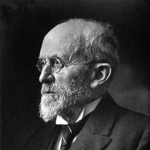Background
Ludwig Hermann Plate was born on August 16, 1862, in Bremen, Germany. Plate’s parents were Heinrich Plate, a language teacher, and the former Phoebe Hind.

Ludwig Hermann Plate (16 August 1862 – 16 November 1937) was a German zoologist and disciple of Ernst Haeckel.
University of Jena, Jena, Thuringia, Germany
Plate studied mathematics and natural science at the University of Jena.
Philipps University of Marburg, Marburg, Hesse, Germany
Plate studied zoology at the University of Marburg.





educator malacologist scientist Zoologist
Ludwig Hermann Plate was born on August 16, 1862, in Bremen, Germany. Plate’s parents were Heinrich Plate, a language teacher, and the former Phoebe Hind.
As a boy, Plate collected plants and animals and attended lectures of the local group of natural scientists. Later Plate studied mathematics and natural science at the University of Jena, where he was fascinated by Haeckel's evolutionary theories, although he considered the concepts too dogmatic.
He studied zoology at the University of Marburg. Plate studied invertebrate zoology under Richard Hertwig and completed his dissertation in 1885, returning to take the examinations for his doctorate at Jena.
Plate was qualified as a lecturer at Marburg in 1888 after further study and became Privatdozent there. From 1898 he was a titular professor at Berlin, where he was named curator of the Museum fur Meereskunde in 1901; he was also an ordinary professor at the Landwirtschaftliche Hochschule. Plate’s museum experience especially impressed Haeckel, whom he succeeded in 1909 as professor of zoology and director of the Phyletische Museum at Jena. Haeckel, who had strongly favored Plate’s appointment, expected to have his wishes followed; but bitter dissension soon broke out between the two. No doubt there were contributing factors in both personalities, but the former pupil and protege did his best to derogate Haeckel and to make his position untenable.
Under Plate’s administration, the facilities of the museum and the Zoological Institute were expanded and the collections augmented, in part with material gathered in the course of his travels. He made expeditions to South America (1893-1896), Greece and the Red Sea area (1901-1902), and the West Indies (1904-1905). His trip to Ceylon and India (1913-1914) yielded data and specimens for research and museum use at Berlin and Jena.
Plate was a founder and the coeditor for the biology of the Archiv fur Rassen-und Gesellscliaftsbiologie from its establishment in 1904. The publication was dedicated to the study of the laws of variability and inheritance, of the development of races, and the relation of the family, society, and the state to “racial and social hygiene,” a goal perhaps initially eugenic but later having increasingly political application. He became professor emeritus in 1934.
Plate's major achievement was in his establishment of the academic differentiation from the modern synthesis in accepting non-Darwinian mechanisms of evolution such as the Lamarckian inheritance of acquired characteristics and orthogenesis. He was the one who coined the term "orthoselection" and "Pleiotropy".
Plate's studies were widely cited by his contemporaries; and his Uber Bedeutung IIIHI Tragweite des Darwin'schen Selectionsprincips (Leipzig, 1900), first published the previous year in Verhandlungen der Deutschen zoologischen Gesellscluift was enlarged and, with the change of title, in its fourth edition by 1913. Plate also wrote numerous articles on evolution, genetics, the Mollusca (Chiton), and on more general zoological subjects. His texts appeared in various editions into the 1930s.
Plate’s views on zoological matters became entwined with his political opinions; and for years he digressed freely during his biological lectures to express his convictions as an avowed member of the Right, as a Pan-Germanist, and as an anti-Semite. He expounded his ideas on the labor movement and was a declared pro-Fascist long before 1933.
Plate was a staunch Darwinist. He examined the theory of natural selection as it might apply to numerous specific instances in which evolutionary changes were discernible. Plate experimented and evaluated the various theories of heredity and evolution of his colleagues before coming to his own neo-Darwinist conclusions.
Plate’s most influential work was in the exposition and defense of Darwin’s theory of natural selection; he also worked in genetics and studied problems of Mendelian heredity. In the wake of the enthusiasm engendered by Darwin’s Origin of Species, new uncertainties had arisen when many observers had experienced difficulties in applying the single all-encompassing theory. The mechanism of evolution was still unclear, and the post-Darwinians of the late nineteenth and early twentieth centuries devised various syntheses.
Plate was a member of the Royal Swedish Academy of Sciences. He was also a member of scientific academies in Germany and Hungary.

23 September 1850 in Friedberg, Hesse – 3 October 1937 in Schlederloh, Bavaria, also Richard Hertwig or Richard von Hertwig, was a German zoologist and professor of 50 years, notable as the first to describe zygote formation as the fusing of spermatozoa inside the membrane of an egg cell during fertilization. Richard Hertwig was the younger brother of Oscar Hertwig, who also analyzed zygote formation.
